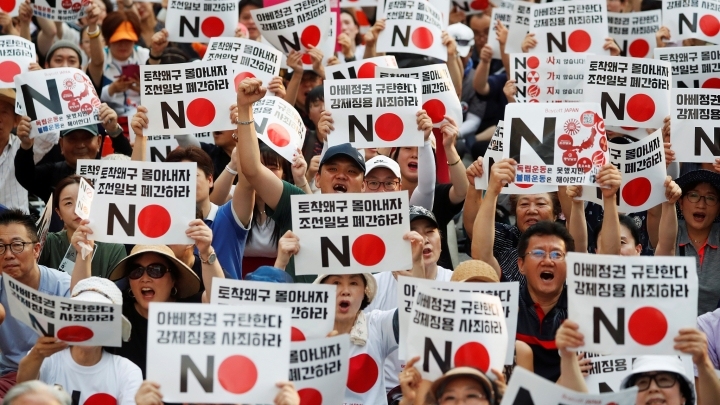South Korea reviewing military intelligence-sharing pact with Japan amid trade row
The South Korean Defense Ministry said Monday that it was reviewing whether to maintain a military intelligence-sharing pact with Japan amid an escalating trade row.
"Regarding the renewal of GSOMIA, the government is reviewing whether it is right to continue exchanging sensitive military intelligence with a country that takes issue with the lack of trust and the security-related problems," Defense Ministry spokesperson Choi Hyun-soo told a press briefing.
Asked about the rising speculation to rescind the bilateral intelligence-sharing pact, the spokesperson said nothing has been decided yet.
It was the reiteration of an announcement by the presidential Blue House, which was made on Friday after Japan's removal of South Korea from its whitelist of trusted trading partners that are given preferential procedure for export.
On July 4, Japan tightened regulations on its export to South Korea of three materials crucial for the production of memory chips and display panels, which are the mainstay of the South Korean export.
![South Korean people express the strong oppositions to the General Security of Military Information Agreement (GSOMIA) which was signed in November 2016 by South Korea and Japan. [File Photo: IC]](https://p2crires.cri.cn/01dcri/images/zhycms_chinaplus/20190805/e68352a6-627a-42d2-8eb9-9b1e29334205.jpg?x-oss-process=image/resize,w_650)
South Korean people express strong oppositions to the General Security of Military Information Agreement (GSOMIA) which was signed in November 2016 by South Korea and Japan. [File Photo: IC]
The General Security of Military Information Agreement (GSOMIA) was signed in November 2016 by South Korea and Japan despite strong oppositions from the South Korean people.
Many South Koreans saw the deal with Japan as unacceptable because the Japanese leadership had yet to sincerely apologize for its militaristic history. The Korean Peninsula was colonized by Imperial Japan between 1910 and 1945.
The GSOMIA had been automatically renewed each year in August. If either party wants to scrap the pact, the party will be required to notify the other of its intention 90 days in advance. This year's notification deadline falls on Aug. 24.
South Korean Defense Minister Jeong Kyeong-doo told a parliamentary defense committee session that Seoul was cautiously reviewing the GSOMIA as Japan linked its export curbs to security issues, though the Seoul government had internally considered the GSOMIA renewal previously.
Jeong noted that the government was very carefully reviewing the GSOMIA as it is intertwined very much in relations between the allies in terms of security issues.
Regarding the annual military drills on and around the South Korean easternmost islets of Dokdo, called Takeshima in Japan, the Defense Ministry spokesperson told reporters that South Korea was still reviewing the schedule and scale of the Dokdo defense exercises.
The Dokdo exercises, involving the South Korean navy, air force and coast guard, have been conducted twice a year, mostly in June and December, but this year's first-half drills were delayed to see developments of the Seoul-Tokyo relations.
Following Japan's removal of South Korea from the whitelist, local media speculated that the South Korean military would stage the Dokdo drills this month.

